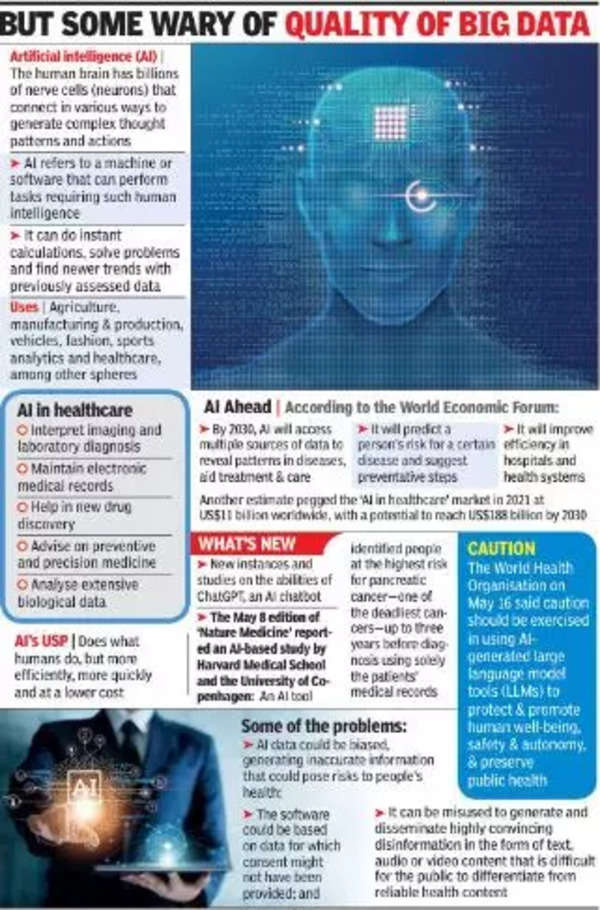
[ad_1]
“Of the 1,050 people diagnosed with TB by artificial intelligence (AI) in 2022, 35% were asymptomatic. It was helpful that they were identified before they could spread the disease in the community,” mentioned BMC government well being officer Dr Mangala Gomare.
Now, Qure.ai, the city-based startup that fitted the AI software program in 9 BMC hospitals and a cell van, desires to replace the programme to detect lung most cancers as nicely.

“Our AI-enabled chest X-ray solution for TB screening can also be used to screen for other abnormalities such as lung nodules that could be indicative of cancer,” mentioned Qure.ai founder Prashant Warier.
“So, we will explore a partnership with the BMC to target lung cancer by expanding our programme in locations where AI-based TB screening is already active,” he mentioned. Dr Gomare mentioned it might be helpful if the identical algorithm used for TB may very well be used to detect lung most cancers as nicely.
Talk on AI is dominated by chatbots comparable to ChatGPT, Bing or Bard, however senior endocrinologist Dr Anoop Misra believes AI is main a “revolution” in healthcare. From selecting up developments, analysing outcomes and serving to with analysis writing, AI is quick changing into part of drugs.
As the editor of ‘Diabetes & Metabolic Syndrome: Clinical Research & Reviews’, an listed medical journal, Delhi-based Misra has already led and edited evaluations on AI-based instruments in drugs. “There is a huge potential with AI in every branch of medicine, be it radiology, ophthalmology or multiple clinical fields,” he mentioned, including that physicians who can not perceive AI “will be left behind”.
Across the world, a number of research are underway to verify if and the way AI and Big Data can additional assist drugs. In Zydus Hospital in Ahmedabad and Aster MIMS in Kozhikode, Warier’s AI-based stroke administration programme is resulting in faster analysis of stroke. “Our apps help clinicians and Medtronic India is helping hospitals with training and solutions,” he mentioned.
Over per week again, a analysis paper in ‘Nature Medicine’ highlighted that an AI-based programme might detect pancreatic most cancers, which is most tough to catch in its early levels, no less than three years upfront. The joint research by Harvard University and the University of Copenhagen used sufferers’ medical information for the prediction.
But not all are impressed as but. According to Dr Shailesh Shrikhande, deputy director at Tata Memorial Hospital and a pancreatic most cancers surgeon, “AI currently depends on big data in various algorithms. If the data is of good quality, then we can get good inference and information,” he mentioned. However, accessing top quality information just isn’t simple particularly when an algorithm wants tens of 1000’s of information factors.
“If we have an AI tool based on high quality data, it would definitely serve as a complimentary guide for doctors,” mentioned Dr Shrikhande. At the second, nevertheless, there isn’t a pancreatic most cancers AI-based algorithm that can be utilized for most people. In their conclusion within the Nature Medicine article, the researchers mentioned their outcomes would assist “design realistic surveillance programs for patients at elevated risk” of pancreatic most cancers. “It cannot be used as a general screening tool as yet,” Dr Shrikhande identified.
Warier, too, mentioned that almost all considerations relating to AI in healthcare originate from the necessity for “unbiased” and “secure handling of patient data”.
“AI is not a replacement to healthcare providers, instead it is an effective tool to augment their efforts,” he mentioned. Dr Misra concurred: docs have to make use of their judgement and expertise to interpret AI information for the time being. “Nothing is 100% yet,” he added.
[adinserter block=”4″]
[ad_2]
Source link